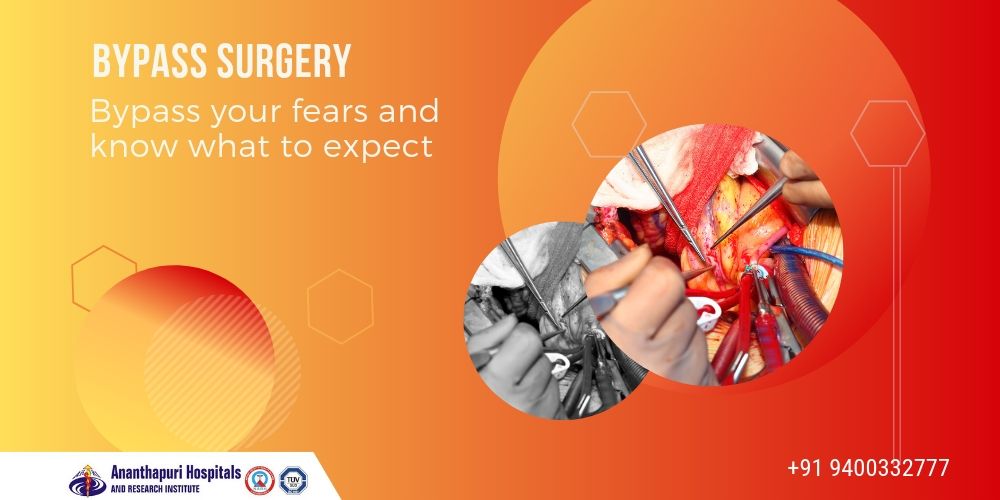- 31/July/2019

Bypass Surgery: What you need to expect - Ananthapuri Hospitals
Until recently a heart surgery meant cutting open the chest cavity to perform the surgery on the exposed heart, bypassing or removing the blocks and closing the cuts.
Patients are almost always terrified when they are told that only surgery will fix their condition. But that need not be the case anymore. You no longer need to fear heart surgeries!
KEEP READING!
There has been a lot of advances in surgical techniques. Surgeries like minimally invasive coronary artery bypass grafting (MICABG) is a relatively new and advanced technique of performing coronary artery bypass graft (CABG) - the medical term for bypass surgery. Unlike conventional CABG where the chest is surgically opened, in this technique, the heart is approached through small incisions in the left side of the chest. At Ananthapuri Hospitals, our highly experienced healthcare professionals use advanced equipment, making it a lot safer and effective for the procedure and recovery.
MICABG has definitive advantages over conventional CABG or open heart surgery in terms of recovery, pain and so on, but it may not be suitable for all. Open heart surgery is recommended for a person who needs multiple coronary artery bypass procedures, complicated cardiac operations, or for someone who’s had heart surgery in the past.
What you need to expect:
Irrespective of the type of surgery, there are some measures you will have to take before and after your surgery to make sure you are mentally and physically prepared. Your doctor will give you instructions as to how you need to be physically prepared. But for you to be mentally prepared, it is always good for you to know what to expect pre and post bypass surgery.
Take a read!
Before your surgery
It will take 4 to 6 weeks for you to recover to the point where you’re able to perform day-to-day tasks. Therefore, you need to make the necessary arrangements and discuss what kind of help you will need after surgery with your family.
The doctor may advise you:
- To stop or provide special instructions about your medications
- When to stop eating or drinking the night before your surgery
- To shave your body hair at the locations where the procedure will take place
You’ll be admitted to the hospital on the morning of your surgery if it is not an emergency operation.
During the procedure
A bypass surgery generally takes between three and six hours to complete. You will be given general anaesthesia, and a breathing tube is inserted into your mouth. This tube is attached to a ventilator which performs the task of breathing for you, during and immediately after your surgery.
Depending on your condition, the doctor may perform CABG through three methods.
- On-pump CABG: A long incision is made in the chest and a heart-lung machine keeps blood and oxygen flowing through your body. This procedure is called on-pump coronary bypass surgery
- Off-pump or beating-heart surgery: It is a challenging procedure in which the patient is operated while his heart is beating. Special types of equipment are used to stabilise the heart during the procedure
- Minimally invasive surgery. Minimally invasive surgery can also be called port-access or keyhole surgery. In this procedure, small incisions are made in the chest and with the help of robotics and imaging, the surgeon operates through these small incisions. After the procedure
The number of days you spend in the ICU and in the regular rooms depend on your condition and surgery. You will have the breathing tube in your throat until you are able to breathe on your own. Food, nutrition and medications will be given to you through intravenous (IV) lines. Urine and fluid from your body will be drained through other tubes.
After your time in the ICU, you will be moved to a regular room for a few days. The incision sites in your body will be checked for any signs of infection. The health professionals will monitor your blood pressure, breath and heart rate. They will also help you manage your pain after surgery. You will be given instructions such as watching for signs of infection in your incisions and taking healthy measures, to follow during recovery.
---------------------------
Most people feel better and might remain symptom-free for as long as 10 to 15 years. The long-term outcome of your surgery will depend on how proactive you were in taking your medications and following the healthy lifestyle recommendations given by your doctor.
The Cardiovascular centre of Ananthapuri Hospitals has been functioning with full-fledged facilities and comprises of surgeons credited with extensive experience as professors and Senior Consultants in leading medical colleges and tertiary care centres.
To book an appointment, call us at +91 9400332777 or visit our hospital at Chacka, NH Bypass, Thiruvananthapuram.
- tags
- Bypass Surgery

